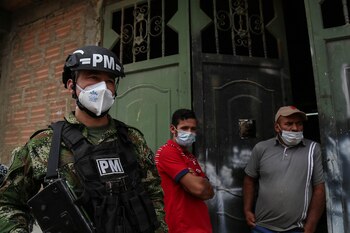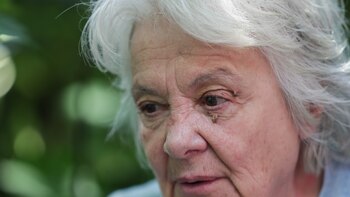
The Full Chamber of the Constitutional Court endorsed military assistance as a legal instrument that can be used in cases of disruption to public order, such as protests. This figure is enshrined in article 170 of the Police Code and was implemented by the Government of Iván Duque last year in the context of the demonstrations of the national strike.
The debate in the Plenary Chamber resulted from a lawsuit filed by the Colombian Commission of Jurists (CCJ), in which they assured that the regulations violated eight articles of the Political Constitution. The CCJ explained that military assistance granted powers similar to that exercised by the president through states of emergency, so they pointed out that it should have been treated as a statutory law, which is what regulates such situations.
“If clear and specific parameters for the interpretation and use of the concept of military assistance are not established, the constitutional model of organization of the security forces would be violated and the exercise of the right to assembly, public demonstration and protest would be jeopardized”, the application document read.
Another argument put forward by the CCJ was that the Congress of the Republic “committed a violation of the statutory reserve of law against fundamental rights”. According to the Council, military assistance could be used to deal with matters related to the exercise of the right to assembly, demonstration and protest. He also indicated that the Military Forces would assume functions that were the responsibility of the National Police.
Despite the lawsuit filed, in this Thursday's presentation, the judges analysed the complaint and supported the regulation with a 6-to-2 vote. In this way, the national Government will be able to make use of military assistance in a serious disruption to security and coexistence, or in the face of an imminent risk or danger, or to face an emergency or public calamity.
For his part, the president assured the Court that during the national strike the measure was necessary. It arose “when during the exercise of the right to public and peaceful demonstration there are acts of violence of such a high level that they violate the full rights and freedoms of citizens”, asserted the president.
The response of the Council of State
It is important to note that in July last year, the Council of State suspended Decree 575 of 2021, through which the government of Iván Duque imparted measures for the restoration of public order, including the use of the Military Forces. However, in November of the same year, the high court overturned the sentence.
Once the Council of State accepted the guardianship brought by citizens of Cali who felt at risk the exercise of their right to social protest, to life and personal integrity, to due process and not to be subjected to enforced disappearance, the National Agency for Legal Defense of the State challenged that decision.
President Duque noted that they challenged the decision “because the decree is not about military assistance, but to develop a constitutional role that the President of the Republic has to instruct governors and mayors on the management of public order.”
It was Judge Sandra Lisset Ibarra, the rapporteur councillor, who finally declared the guardianship action brought by demonstrators against the decree inadmissible, leaving the suspension of military assistance without legal floor. Thus, with the decision of the Council of State and the Constitutional Court, this remedy was endorsed in the protests that the country may present.
KEEP READING:
Últimas Noticias
Debanhi Escobar: they secured the motel where she was found lifeless in a cistern

The oldest person in the world died at the age of 119

Macabre find in CDMX: they left a body bagged and tied in a taxi
The eagles of America will face Manchester City in a duel of legends. Here are the details

Why is it good to bring dogs out to know the world when they are puppies




